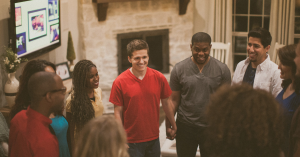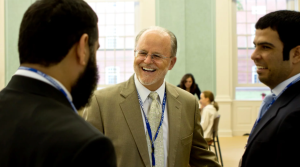“The Weekend Wanderer” is a weekly curated selection of news, stories, resources, and media on the intersection of faith and culture for you to explore through your weekend. Wander through these links however you like and in any order you like.
Last week I took a break from “The Weekend Wanderer” as I spent a few days away with my family in northern Wisconsin. I never checked my email once and never went online throughout that time away, which was one of the greatest head-clearing moments I’ve had all summer. I hope you can make space to do that sometime as well. You will not regret it, even if you never leave your home. Of course, the moment I returned and opened my email the floods returned, but there was still value in getting to dry ground for short while to remember what life can be like.
 “A Biblical Critique of Secular Justice and Critical Theory” – Tim Keller has put together a pretty striking series of articles featured in Gospel in Life, Redeemer Churches & Ministries’ Quarterly Newsletter. The series features two earlier articles, “The Bible and Race” and “The Sin of Racism,” and promises one further article on “Justice in the Bible.” This third in the series explores the wide ranging conceptions of justice in the broader culture, offering biblical responses to each coupled with some further attention to the hot topic of critical theory as part of a discussion. The entire series is well worth the read.
“A Biblical Critique of Secular Justice and Critical Theory” – Tim Keller has put together a pretty striking series of articles featured in Gospel in Life, Redeemer Churches & Ministries’ Quarterly Newsletter. The series features two earlier articles, “The Bible and Race” and “The Sin of Racism,” and promises one further article on “Justice in the Bible.” This third in the series explores the wide ranging conceptions of justice in the broader culture, offering biblical responses to each coupled with some further attention to the hot topic of critical theory as part of a discussion. The entire series is well worth the read.
 “Nonconforming” – Here’s Laurent Dubreuil in Harper’s Magazine about the challenges and inanities of identity politics: “Whereas identity politics, as theorized four decades ago, aimed to liberate the oppressed and to oppose American capitalism, its main form today is more invested in changing the direction of domination and in multiplying restrictions. It is the social order of the day, its rhetoric ubiquitous in the neurotic centers of the American economy (universities, the media, the tech sector). Under this regime, identities, once affirmed, are indisputable. If I say, ‘As an x, I think. . . ,’ I am no longer voicing an opinion that can be evaluated or critiqued within a shared space of discourse; I am merely saying what I am. If you disagree with me, you may trace everything I say back to my identity before availing yourself of corresponding counterarguments: you say a because you are an x, but I am a y and I therefore believe in b. Such identities, I insist, are not emancipatory, neither at the psychological nor at the political level. We all should have the right to evade identification, individually and collectively.”
“Nonconforming” – Here’s Laurent Dubreuil in Harper’s Magazine about the challenges and inanities of identity politics: “Whereas identity politics, as theorized four decades ago, aimed to liberate the oppressed and to oppose American capitalism, its main form today is more invested in changing the direction of domination and in multiplying restrictions. It is the social order of the day, its rhetoric ubiquitous in the neurotic centers of the American economy (universities, the media, the tech sector). Under this regime, identities, once affirmed, are indisputable. If I say, ‘As an x, I think. . . ,’ I am no longer voicing an opinion that can be evaluated or critiqued within a shared space of discourse; I am merely saying what I am. If you disagree with me, you may trace everything I say back to my identity before availing yourself of corresponding counterarguments: you say a because you are an x, but I am a y and I therefore believe in b. Such identities, I insist, are not emancipatory, neither at the psychological nor at the political level. We all should have the right to evade identification, individually and collectively.”
 “20 Quotes on Loving Church Members with Different Politics” – Matt Smethurst shares 20 quotes from Jonathan Leeman and Andy Naselli’s new booklet, How Can I Love Church Members with Different Politics? (Crossway, 2020). Here’s one example to get you thinking: “The gospel does not automatically resolve all our wisdom-based political judgments in the here and now. It helps us love and forbear with one another amid those different wisdom-based judgments. It creates unity amid diversity, not uniformity.”
“20 Quotes on Loving Church Members with Different Politics” – Matt Smethurst shares 20 quotes from Jonathan Leeman and Andy Naselli’s new booklet, How Can I Love Church Members with Different Politics? (Crossway, 2020). Here’s one example to get you thinking: “The gospel does not automatically resolve all our wisdom-based political judgments in the here and now. It helps us love and forbear with one another amid those different wisdom-based judgments. It creates unity amid diversity, not uniformity.”
 “Christian groups unveil new criminal justice reform push” – From the Associated Press: “A coalition of Christian groups including the Church of God in Christ and the National Association of Evangelicals is launching a new criminal justice reform push that seeks to rally believers behind policing changes grounded in biblical principles. Set to be announced Wednesday, the Prayer & Action Justice Initiative has its roots in a campaign started in the aftermath of the coronavirus to help save small churches at risk of closing, with top contributors to that work now channeling their energy toward the criminal justice project. It is expected to include prayer gatherings, nonviolent protests and policy advocacy — all aimed at advancing the cause of racial equity in the justice system.”
“Christian groups unveil new criminal justice reform push” – From the Associated Press: “A coalition of Christian groups including the Church of God in Christ and the National Association of Evangelicals is launching a new criminal justice reform push that seeks to rally believers behind policing changes grounded in biblical principles. Set to be announced Wednesday, the Prayer & Action Justice Initiative has its roots in a campaign started in the aftermath of the coronavirus to help save small churches at risk of closing, with top contributors to that work now channeling their energy toward the criminal justice project. It is expected to include prayer gatherings, nonviolent protests and policy advocacy — all aimed at advancing the cause of racial equity in the justice system.”
 “The end of secularism is nigh: The West’s ability to market this culturally conditioned assumption is dying“ – Here comes Tom Holland to alert us to what we should already know about the declining influence of secularism around the world. Holland highlights how this is seen in recent startling changes taken by Prime Minister Modi in India and President Erdogan in Turkey. This “should serve as a wake-up call to the West that it is not only its financial, economic and military muscle that is currently atrophying. So too is its ability to market its culturally conditioned assumptions as universal.”
“The end of secularism is nigh: The West’s ability to market this culturally conditioned assumption is dying“ – Here comes Tom Holland to alert us to what we should already know about the declining influence of secularism around the world. Holland highlights how this is seen in recent startling changes taken by Prime Minister Modi in India and President Erdogan in Turkey. This “should serve as a wake-up call to the West that it is not only its financial, economic and military muscle that is currently atrophying. So too is its ability to market its culturally conditioned assumptions as universal.”
 “He Loved Muslims Because He Loved Jesus. The Bible Showed Him How.” – Joseph Cummings remembers Rick Love, former international director of Frontiers and founder of Peace Catalyst, who passed away on December 29 after complications of cancer: “Rick Love loved Jesus above all else. He loved the Bible as God’s Word. Rick’s love for Jesus led him to love Muslims. But his love for Scripture eventually changed his mind about how to love Muslims.”
“He Loved Muslims Because He Loved Jesus. The Bible Showed Him How.” – Joseph Cummings remembers Rick Love, former international director of Frontiers and founder of Peace Catalyst, who passed away on December 29 after complications of cancer: “Rick Love loved Jesus above all else. He loved the Bible as God’s Word. Rick’s love for Jesus led him to love Muslims. But his love for Scripture eventually changed his mind about how to love Muslims.”
Music: Sigur Rós, “Glósóli,” from Takk
[I do not necessarily agree with all the views expressed within the articles linked from this page, but I have read them myself in order to make me think more deeply.]
























